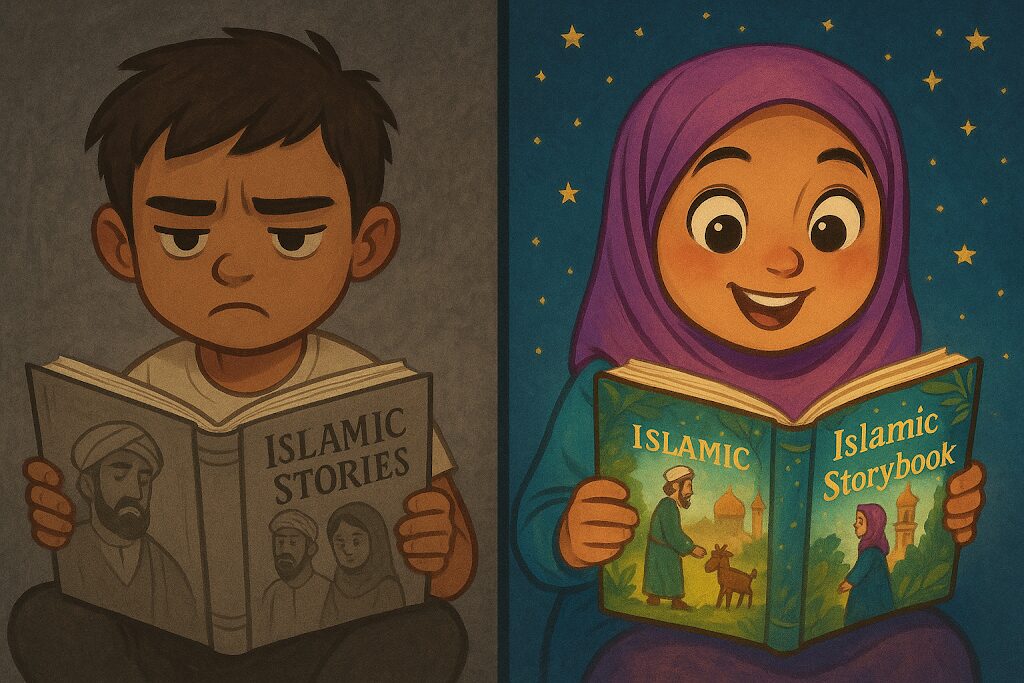Moderate Muslim parenting doesn’t mean compromising on faith or values. It means raising children who understand Islam through empathy, routine, and real-life experiences. As Muslim parents living in the West, many of us find ourselves balancing tradition with modern parenting practices. This guide shares 7 powerful habits that can help you raise confident, faith-driven children without extremes.

Table of Contents
Why Moderate Muslim Parenting Matters
The world our kids are growing up in is full of contradictions. Muslim values can feel out of sync with modern media and school culture. But becoming overly strict or completely disengaged are not the only options. Moderate Muslim parenting offers a path that is spiritually grounded and emotionally intelligent. It meets children where they are while guiding them toward where they can grow.
1. Lead with Conversations, Not Commands
Children today respond better to dialogue than dogma. Instead of saying “because I said so,” explain the why behind Islamic actions. For example, when teaching about prayer, talk about gratitude and mindfulness. This builds trust and deeper understanding.
2. Make Faith a Daily Habit, Not a Weekly Event
Islam isn’t just for Friday prayers. Moderate Muslim parenting means weaving faith into daily routines:
- Bedtime du’a and storytime
- Saying Bismillah before meals
- Talking about the Prophet’s character in everyday moments
These small acts create spiritual rhythm without rigidity.
3. Use Storybooks to Teach Moral Lessons
Children learn best through stories. Books like Adam Learns About Tawakkul or Nora’s Snowy Sadaqah show how kids can live their faith with kindness, resilience, and joy. If you’re a moderate Muslim parent, these books provide relatable, faith-centered content that doesn’t preach—it inspires.
You can explore our catalog of fully illustrated storybooks here:
👉 Muslim Kids Storybook Catalog
Or you can access our free digital library and find your next favourite bedtime story here:
4. Let Your Children See You Struggle and Grow
Parents often hide their own challenges. But your growth is part of their education. When you admit you don’t know something or that you’re working on your patience, you show them that being Muslim is a journey—not a checklist.
5. Create Safe Spaces for Hard Questions
Moderate Muslim parenting encourages children to ask, even when the questions are difficult: “Why do we fast?” or “What if I don’t feel like praying?” Your openness helps prevent confusion or rebellion later. Instead of shame, lead with curiosity.
6. Encourage Islamic Identity Through Joy
Joy is a powerful vehicle for belonging. Celebrate Ramadan with crafts and treats. Let them decorate their prayer space. Make Eid about more than food and clothes—tell stories, start traditions. Your joy becomes theirs.

7. Connect Islamic Values with Everyday Life
Show them how Islam applies to school, friendships, and even online behavior:
- Honesty in group projects
- Respect for teachers
- Kindness to siblings and animals
This teaches children that Islam isn’t something separate—it’s something they live.
Free Resources for Moderate Muslim Parents
- Mayous Free eBook Library – Faithful stories with moral depth
- Pew Research on Muslim Parenting
- Yaqeen Institute: Raising Resilient Muslim Children
Final Reflection
You don’t have to be perfect. You just have to be present. Moderate Muslim parenting is about finding strength in softness, guidance in imperfection, and faith in your everyday actions. Keep going. You’re not alone.
This article is part of our ongoing series on parenting, faith, and modern Muslim family life. Subscribe to our newsletter for more reflections and resources.

